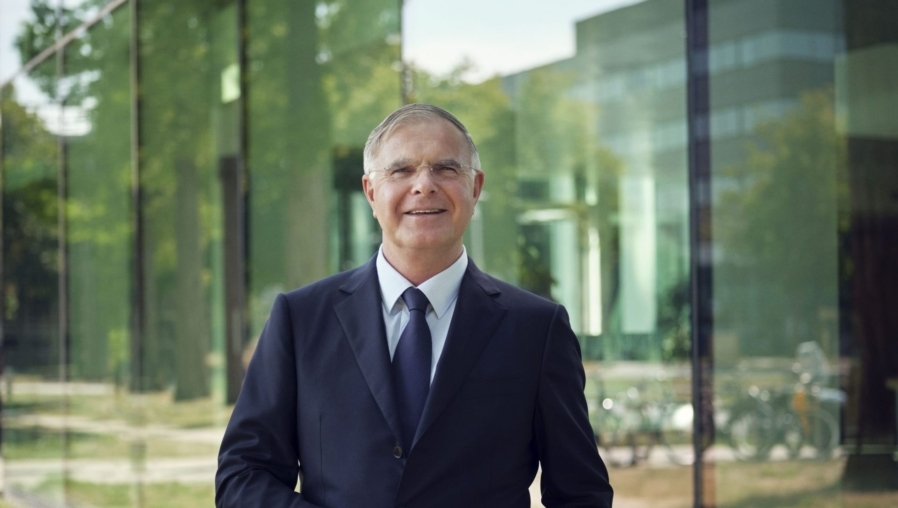Interview Jan van de Winkel: keynote speaker of the 2025 Utrecht Science Lecture.

As one of the founding forces behind the international biotech company Genmab and a global leader in immunotherapy, Prof. Dr. Jan van de Winkel brings 30 years of scientific insight and biotech experience to the stage as keynote speaker of the 2025 Utrecht Science Lecture.
Taking place on September 26 during the fifth edition of Utrecht Science Week, his talk, “Cracking the Code on Cancer and Other Serious Diseases: The Past, Present, and Future of Immunotherapy,” promises to explore how cutting-edge antibody science, cross-sector collaboration, and AI are transforming medicine. With deep roots in Utrecht’s innovation ecosystem and a continued commitment to advancing both industry and academic research, Jan van de Winkel will offer a unique, forward-looking perspective on how we can shape a healthier future together.
In this article, he shares a preview of his keynote and reflects on the breakthroughs, partnerships, and purpose that drive his work.
Your keynote is titled “Cracking the Code on Cancer and Other Serious Diseases.” What does that phrase mean to you, and how close are we to truly “cracking” that code?
‘We are entering an incredibly exciting era in medicine. Our understanding of cancer and other serious diseases is advancing at a remarkable pace. We are increasingly able to identify the mechanisms behind disease progression and resistance, and that deeper insight is rapidly translating into better treatments for more patients. While there is still much work to be done, we are certainly making significant strides toward “cracking the code” and unlocking the full potential of the immune system to fight and, ultimately, prevent disease.’
Genmab has been part of the Utrecht Science Park for over 25 years. How has the region influenced your work, and why is it important for biotech companies to be part of this ecosystem?
‘The Utrecht Science Park provides a vibrant environment where academic excellence, clinical practice, and industry innovation come together. The proximity to world-class institutions like UMC Utrecht, Princess Máxima Center, Utrecht University and HU fosters cross-disciplinary collaboration and inspiration.
This kind of cross-fertilization is essential for accelerating discoveries and driving the development of better therapies. Being based in this dynamic ecosystem has been catalytic for Genmab’s growth and impact, both locally and globally.’
Immunotherapy has transformed cancer care over the past decade. What do you see as the next big breakthrough in this field?
‘The next frontier is the development of immunotherapies that are not only highly effective and very safe but also have the potential to prevent the onset of active disease altogether.
It would be a game-changer, particularly in cancer, to prevent development of symptomatic disease and keep patients free of active disease. A powerful example is the work with daratumumab, one of the therapeutic antibodies we created, in high-risk smoldering multiple myeloma, where early treatment can delay or even prevent progression to symptomatic disease. That’s the kind of proactive, patient-centered innovation we are aiming for, shifting from treating symptoms to intervening early and halting disease before it becomes active.’
Collaboration is a recurring theme in your keynote. Can you give an example of how partnerships have accelerated innovation at Genmab?
‘Collaboration is in our DNA at Genmab. One of our pivotal scientific breakthroughs, the development of our innovative bispecific antibody technology platform, was born out of a close partnership with Sanquin. Together, we deciphered the biologic mechanism behind bispecific IgG antibody generation. This technology platform is the backbone of ~ half of our product pipeline and several approved bispecific antibody therapeutics.
Another key example is our early clinical work on daratumumab with UMC Utrecht. It was a challenging yet rewarding journey that led to a first daratumumab publication in the New England Journal of Medicine and, ultimately, regulatory approval. Today, daratumumab is the second-largest cancer medicine in the world. These collaborations exemplify the power of combining academic rigor with industry innovation and the profound impact it can have on patients.’
Genmab’s vision includes transforming cancer treatment, making cancer a chronic disease. What are the biggest challenges in achieving this, and what gives you hope that we will get there?
‘One of the major challenges is not only destroying cancer cells effectively but doing so in a way that also trains and activates the patient’s immune system to keep the disease at bay. We must find ways to prevent relapse while minimizing side effects.
What gives me hope is the extraordinary progress we’ve already seen in immuno-oncology, and the growing toolbox of next-generation technologies we can apply, from bispecific antibodies, novel antibody-drug conjugate technologies, to AI-driven drug discovery. Combined with strong partnerships and a long-term vision, I believe we are on a path to transforming cancer into a manageable, chronic condition people can live with, enjoying high-quality lives.’
Why should students, young researchers, or healthcare professionals attend your keynote during Utrecht Science Week? What do you hope they will take away?
‘The keynote will offer fascinating examples of how novel scientific insights into the functioning of our immune system can lead to new technologies and the development of innovative medicines. It provides a lively look into the dynamic world of biotechnology, where networking between academia, pharma, and biotech companies plays a crucial role. I’ll also share how AI and digital technologies are beginning to transform drug discovery and life sciences.
Importantly, I hope to highlight how teamwork, a strong purpose-driven strategy, and perseverance can lead to worldwide success, with hundreds of thousands of patients benefiting from novel breakthrough treatments. And above all, I want to show how rewarding and energizing it can be to work at the interface of science and business. It’s a dynamic and inspiring ecosystem, and one that’s deeply impactful for patients, their families, and society at large.’